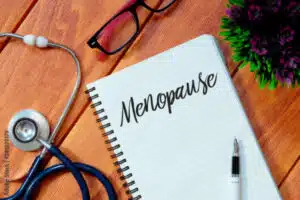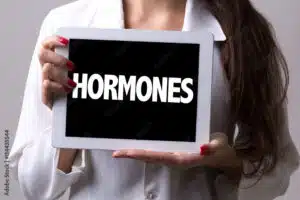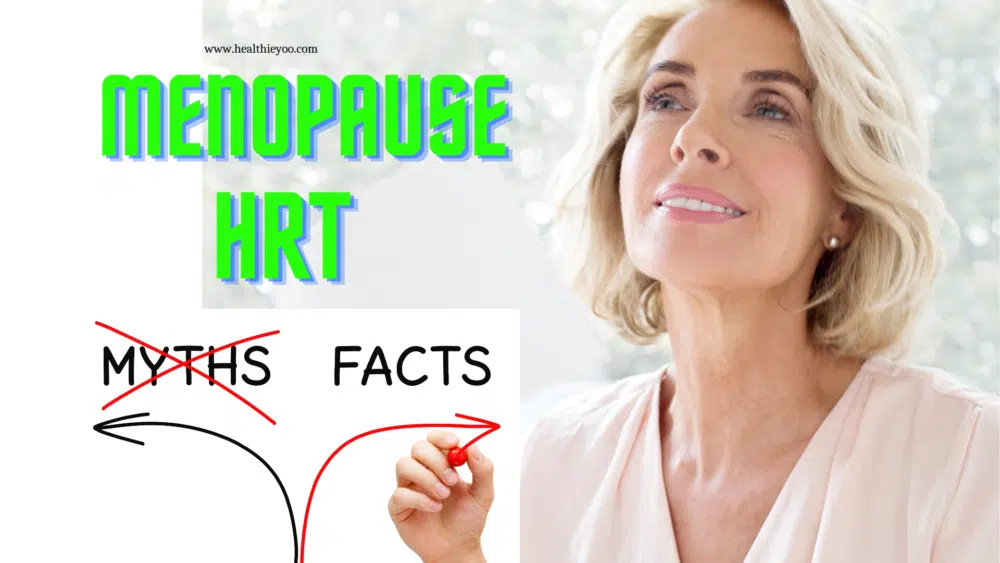Several misconceptions and myths prevail regarding the management of menopause, blood tests, and HRT. Here are the 13 menopause and HRT myths busted by BMS-certified menopause specialist and reproductive medicine specialist at University College London Hospitals NHS Foundation Trust, Dr. Vikram Talaulikar, for women to make informed decisions based on the advice of a healthcare professional.
Every individual’s experience of the menopausal transition is unique. While some experience minimal menopausal symptoms, others can majorly impact their quality of life and work from severe symptoms. Menopausal hormone changes also impact long-term bone, muscle, metabolic, heart, and brain health. There are several lifestyle, non-hormonal and hormonal interventions that can help improve quality of life and protect long-term health post-menopause.
HRT (hormone replacement therapy) refers to the replacement of estrogen, progesterone, and testosterone hormones for the relief of menopausal symptoms. It continues to be the most effective treatment for debilitating menopausal symptoms such as hot flushes, night sweats, sleep disturbance, fatigue, joint aches, brain fogging, mood fluctuations, and vaginal dryness.
The use of HRT plummeted towards the beginning of this century following the publication of results of some of the large clinical trials which suggested an increased risk of stroke, cardiovascular disease, and breast cancer associated with HRT use. Over the past decade, further research, and reanalysis of the data from original studies have revealed that for the vast majority of women under the age of 60, the benefits of HRT outweigh any risks.
Individualized treatment of menopausal symptoms based on the nature of symptoms, past medical history, and family history is currently recommended and a ‘one size fits all’ approach should not be used. Women should be helped by healthcare professionals to make informed treatment decisions based on accurate and evidence-based information about various options available.
But despite the recent changes to recommendations regarding the diagnosis and management of menopause, misconceptions, and myths prevail regarding the use of blood tests and HRT. This article looks at the research behind menopause and HRT to dispel some of the common myths.
Menopause & HRT Myths # 1
Menopausal symptoms only last a few years and treatment interventions such as HRT should only be offered for a maximum of five years.
The nature and duration of menopausal symptoms vary widely amongst individuals. While some women have no/minimal symptoms for a few months or years, others can have severe symptoms that can last for 15 years or longer. Women who have surgical menopause usually tend to have more severe symptoms due to the abrupt stopping of hormones. There is no arbitrary limit to prescribing HRT. As long as the benefits from HRT outweigh the potential risks – women may choose to continue HRT long-term.
Menopause & HRT Myths # 2
Testosterone is a male hormone and has nothing to do with menopause.
Testosterone is not just a male hormone. Women produce plenty of testosterone from both ovaries and adrenal glands. The levels of testosterone decline gradually during the menopausal transition. Testosterone plays a key role in various body functions including energy levels, libido, bone, and muscle health. Currently, testosterone is recommended as part of HRT for women who suffer from persistent low sexual desire when other possible causes for this have been ruled out. There are plans for a large research trial to study other potential benefits of testosterone therapy.
Menopause & HRT Myths # 3
HRT causes weight gain.
There is no evidence to support a direct link between HRT and weight gain. Women may gain weight in the middle years due to changes in their diet, physical activity patterns, and lifestyle. A slowing metabolic rate, insulin resistance, and redistribution of body fat towards the middle may also contribute to this. A healthy diet and regular exercise are important to prevent such weight gain. HRT may sometimes help with better energy levels and more physical activity which can indirectly aid weight loss. Some women may experience side effects of bloating and fluid retention on HRT, which can lead them to believe that they are putting on weight.
Menopause & HRT Myths # 4
All forms of HRT cause breast cancer.
Breast cancer is one of the biggest fears associated with the use of HRT and a common reason for women to choose not to take it. HRT with oestrogen alone is associated with no or minimal increase in the risk of breast cancer. Oestrogen-only HRT can only be taken by women who have had a hysterectomy. Combined HRT (oestrogen + some form of progesterone) can be associated with a small increased risk; however, this is related to the treatment duration and reduces once HRT is stopped.
For women of average weight in developed countries, 5 years of combined HRT starting at age 50 years, would increase breast cancer incidence by about 1 in every 50 users based on observational data. The absolute risk is therefore very small and is usually outweighed by the benefits of HRT for bone and heart health. The risk appears to be lower with some types of progesterone (dydrogesterone or natural progesterone) as compared to others. There are many other comparable risk factors for developing breast cancer such as being overweight, drinking 2-3 units of alcohol daily, smoking, and undertaking little or no exercise.
There is no increased risk of breast cancer from combined HRT in women who take it early (40-45) or in premature menopause (below 40). In these women, taking HRT simply replaces the hormones that the body would otherwise produce until the age of natural menopause and therefore does not carry the risks which are typically associated with the use of HRT after the age of 50.
Menopause & HRT Myths # 5
HRT has the risk of causing heart attacks and stroke
HRT in any form does not increase the risk of heart disease if started before the age of 60 years. Taking combined HRT immediately after menopause for up to 10 years can reduce the risk of heart disease and dying from heart disease. There is a very small increased risk of stroke in women who take oral combined HRT, but this risk can be avoided by taking oestrogen through the skin in the form of gels, patches, sprays, or implants rather than oral tablets. The risk of stroke in women under 60 is very low regardless of whether HRT is used.
Menopause & HRT Myths # 6
All types of HRT can cause blood clots.
Oral HRT can cause a small increase in the likelihood of having a blood clot. This increased risk is higher in presence of other risk factors such as obesity, reduced mobility, or past episodes of blood clots. Maintaining a healthy weight and taking oestrogen as either a gel, patch, spray, or implant (through skin bypassing the gut and liver) can effectively prevent the risk of blood clots.
Menopause & HRT Myths # 7
If you need HRT, you are beyond getting pregnant.
HRT is mainly used for the treatment of debilitating menopausal symptoms in women of all ages. In women who have had early or premature menopause, HRT is also prescribed for the prevention of osteoporosis and cardiovascular disease. However, HRT is not a contraceptive and young women can conceive while taking HRT. About 5-10% of women with premature ovarian insufficiency can achieve pregnancy naturally.
Contraception to avoid an unwanted pregnancy should be continued until menopause, which is defined as two years after the last natural menstrual period in women under age 50 and one year after the last natural menstrual period in women over age 50. If menopause cannot be confirmed, contraception should be continued until age 55.
Menopause & HRT Myths # 8
HRT delays menopause.
HRT is effective in treating the symptoms of menopause as it replaces the hormone/hormones which stop being produced in the body. HRT however does nothing to delay the decline in ovarian function. Any menopausal symptoms which women experience after stopping HRT are just the symptoms they would have anyway experienced even if they had never had HRT. In fact, when coming off HRT – it is advisable to reduce the dose of hormones and come off gradually to avoid oestrogen ‘withdrawal’ symptoms. Such symptoms, if at all they occur, are usually temporary and decrease quickly with time for most women.
Menopause & HRT Myths # 9
HRT carries the same risks as the pill.
Although the pill and HRT both contain oestrogen and synthetic progesterone hormones, the hormones in HRT are less potent and in lower (more physiological) doses resulting in differences in side effects and risk profiles. Most pills contain a synthetic oestrogen compound – ethinyl oestradiol combined with synthetic progesterone which is usually a derivative of testosterone. The majority of HRT preparations combine natural oestrogen (17 beta oestradiol) with either synthetic or natural progesterone. HRT is not contraindicated in women who suffer from migraines (patches, implants, sprays, or gels preferred) and transdermal HRT preparations avoid the risk of blood clots as compared to oral pill formulations.
Menopause & HRT Myths # 10
Bio-identical hormones to treat menopause symptoms are safer than conventional regulated HRT.
Many women choose to take ‘natural’ or ‘bio-identical’ hormone products to treat their menopausal symptoms; however, these terms can be misleading or confusing. Many of the HRT compounds sold under these categories have often been custom-made by the individuals/clinics prescribing them and have not been subjected to the same level of rigorous scientific testing through randomized trials regarding their long-term safety as the conventional regulated HRT preparations. Bio-identical HRT preparations (which are not part of regulated medical treatments) are currently not recommended for use by the British Menopause Society.
Menopause & HRT Myths # 11
HRT cannot be prescribed until a woman stops her periods and her symptoms are unbearable.
Many women will suffer from significant menopausal symptoms long before their last menstrual period (during perimenopause) and HRT can be safely prescribed to alleviate symptoms. HRT can also help even if the woman is having mild symptoms. In addition, there is increasing evidence that the earlier HRT is started, the more the benefits for protection from osteoporosis and heart disease.
Menopause & HRT Myths # 12
Women need to have multiple tests (blood or scans) to make sure that they are menopausal and can take HRT.
The majority of women do not need any specific tests before HRT is prescribed. The diagnosis of menopause is based on symptoms and HRT is prescribed for the alleviation of symptoms. If a woman above the age of 45 is suffering from typical menopausal symptoms, she can be offered HRT if the symptoms are bothering her and having an impact on her day-to-day life. Blood tests can help in some situations e.g. if the symptoms are atypical, an alternative diagnosis is suspected, or the woman is younger than 45, and a diagnosis of early or premature menopause is suspected. For a small number of women, tests such as blood hormone profile, blood clotting screen or pelvic ultrasound may be needed based on their past medical or gynecological history.
Menopause & HRT Myths # 13
HRT should not be prescribed if there is high blood pressure or migraines or diabetes.
HRT can be safely prescribed in these conditions as long as blood pressure and diabetes are controlled with lifestyle and/or medical interventions. Transdermal HRT through the skin is usually recommended over oral HRT in women with medical risk factors. Regular reviews of HRT at least once every year are important to make sure benefits continue to outweigh risks.
Further reading

Dr. Vikram Talaulikar
Related Posts

Menopause Transition – Keys to Thriving in Menopause
If you are a woman in midlife, you have probably heard a lot about menopause recently in the media. But what is menopause, and why

Enlighten Your Menopause – Symptoms And HRT by Menopause Doctor
Menopause, the second flowering in life, is a time to flourish and bloom for EVERY woman. If we all enlighten ourselves, doctors, wives, husbands, daughters

Menopause and Insulin Resistance, Diet, Exercise, HRT?
Menopause and Insulin Resistance, what can we do? Diet for insulin resistance? Exercise? HRT? Why does menopause increase the risk of type 2 diabetes? Menopause

Genitourinary Syndrome Of Menopause-Do Women Know?
What is Genitourinary Syndrome of Menopause? The genitourinary syndrome of menopause is a condition that can go on for years, hidden, due to embarrassment

Can We Have Cycle Syncing Workouts And Diet?
Nutrition and training around your menstrual cycle is a trending topic in the media. Can we have cycle syncing workouts or a cycle syncing diet?

Xenoestrogens, The Environmental Toxins & Hormonal Imbalances in Women – Are You Suffering the Effects of Oestrogen Dominance?
What are xenoestrogens, the endocrine disruptors, and how do they affect women’s health by causing oestrogen dominance & hormonal imbalance? Check out ways to detoxify


